Overview
The article titled "10 Reasons to Choose a Native App Framework for Development" presents a compelling overview of the challenges developers face when selecting app frameworks. It highlights how native app frameworks address these challenges, offering superior performance, security, user experience, and community support. This focus on native frameworks not only enhances the development process but also ensures the delivery of high-quality applications. Various statistics and expert insights discussed throughout the text further underscore these benefits, making a strong case for developers to consider native frameworks in their projects.
Introduction
In the fast-paced world of mobile app development, developers often encounter significant challenges when choosing the right framework. Have you ever wondered how your choice between native and cross-platform frameworks could influence the success of your application? Native frameworks rise to the occasion, allowing developers to tap into the full potential of device capabilities. This results in unmatched performance, enhanced security, and superior user experiences that resonate with users.
As the demand for functionality and responsiveness grows, the benefits of native development become increasingly evident. Imagine having seamless access to hardware features and robust community support that fosters innovation at your fingertips. Native frameworks provide a comprehensive toolkit for building future-proof applications that stand out in a competitive landscape.
This article explores the myriad advantages of choosing native frameworks, emphasizing their essential role for developers aiming to create high-quality, engaging applications. By focusing on the specific features and benefits of native development, we will illustrate why these frameworks are crucial for enhancing productivity and code quality. Are you ready to elevate your app development process?
Kodezi | Professional OpenAPI Specification Generator - AI Dev-Tool: Streamline Your Native App Development Process
Developers often face significant challenges in producing standardized API documentation, which can be time-consuming and detract from their core coding responsibilities. Kodezi's Professional OpenAPI Specification Generator transforms this process, significantly reducing the time usually dedicated to documentation tasks. Research indicates that programmers allocate approximately a third of their development time to manual API testing with improvised tools, which can impede productivity. By incorporating Kodezi into your workflow, you not only accelerate the development process of the native app framework but also ensure compliance with professional standards. This enables programmers to focus on designing robust software instead of being burdened by documentation responsibilities.
Furthermore, Kodezi allows teams to automatically produce OpenAPI specifications and establish Swagger sites for their APIs, enhancing collaboration and simplifying the integration process. Have you considered how much time your team spends on documentation? Real-world examples demonstrate that organizations adopting automated API documentation tools report significant improvements in performance and customer retention. Expert opinions consistently emphasize that standardized API documentation results in enhanced developer productivity, allowing teams to produce high-quality software more efficiently.
In addition, Kodezi offers advanced debugging features that can streamline your projects. What if you could spend less time on documentation and more time on coding? Try Kodezi today to experience the benefits of automated OpenAPI 3.0 specification generation and see how it can transform your development process.
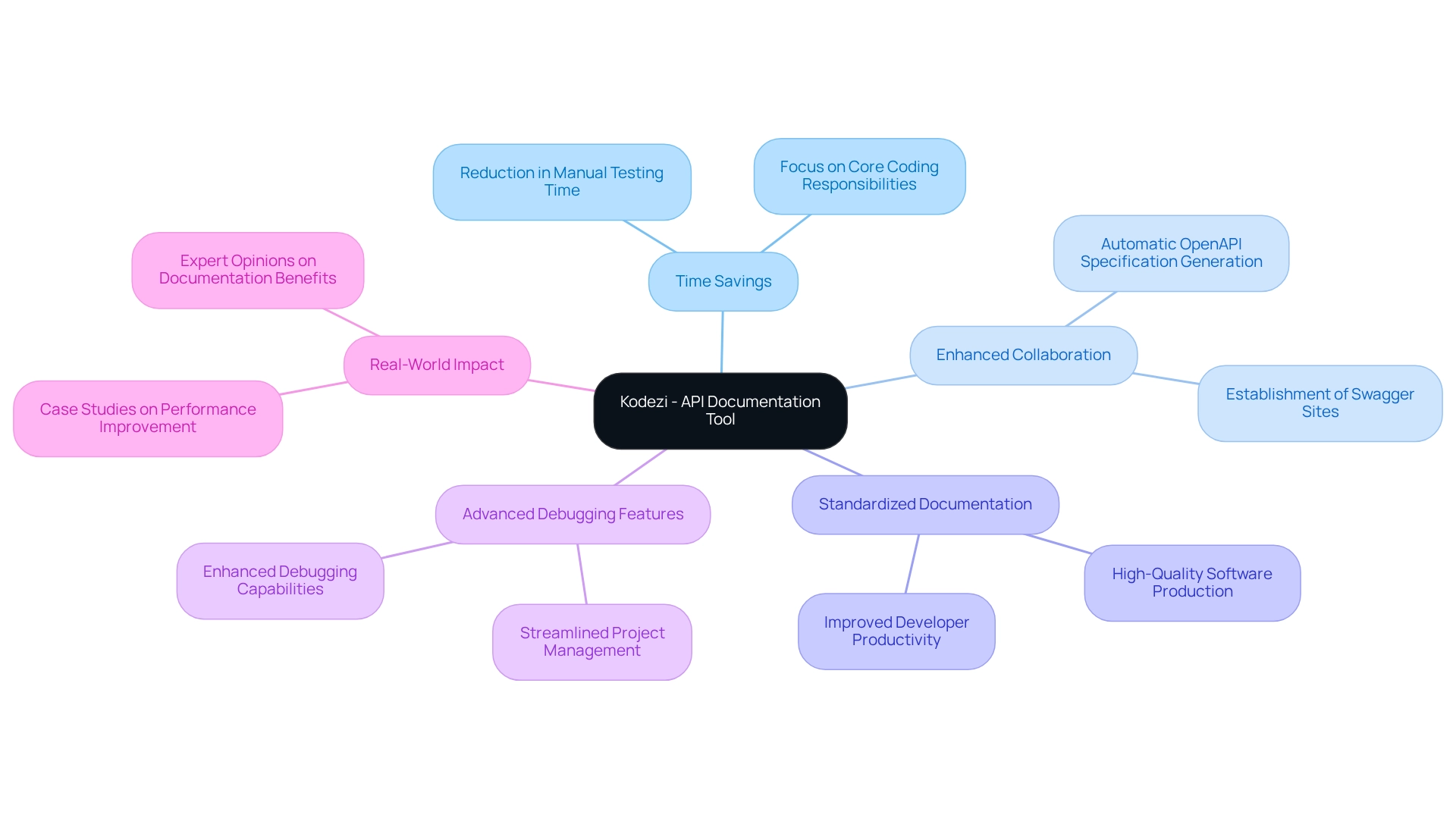
Unmatched Performance: Why Native Frameworks Outshine Cross-Platform Alternatives
Developers often encounter significant challenges when working with a native app framework, which is meticulously crafted for its specific platform. This specialization enables them to harness the full potential of device hardware. As a result, native app frameworks deliver significantly faster load times, smoother animations, and superior responsiveness compared to cross-platform solutions. Have you ever wondered how local applications manage to outperform their cross-platform counterparts? They leverage platform-specific APIs, which not only improve performance but also enhance the overall user experience.
Furthermore, recent statistics reveal that applications built using a native app framework consistently surpass cross-platform equivalents in satisfaction ratings, particularly in fields demanding intensive processing, such as AI and machine learning integration. The combination of 5G and edge computing further enhances user experiences by reducing latency and improving data processing speeds. In 2025, the performance benefits of local frameworks are expected to become even more pronounced, with load times enhancing by up to 30% in real-world applications.
Industry leaders stress the importance of utilizing platform-specific capabilities. While cross-platform frameworks are advancing, they still fall short in providing the same level of performance and access to original features offered by a native app framework. As Rohit Changani wisely advises, "Evaluate your specific needs and consult with experts to make the right choice." Consequently, the selection between local and cross-platform development should align with particular business objectives and the intended features of the app. Are you ready to explore the tools available on Kodezi to enhance your development process?
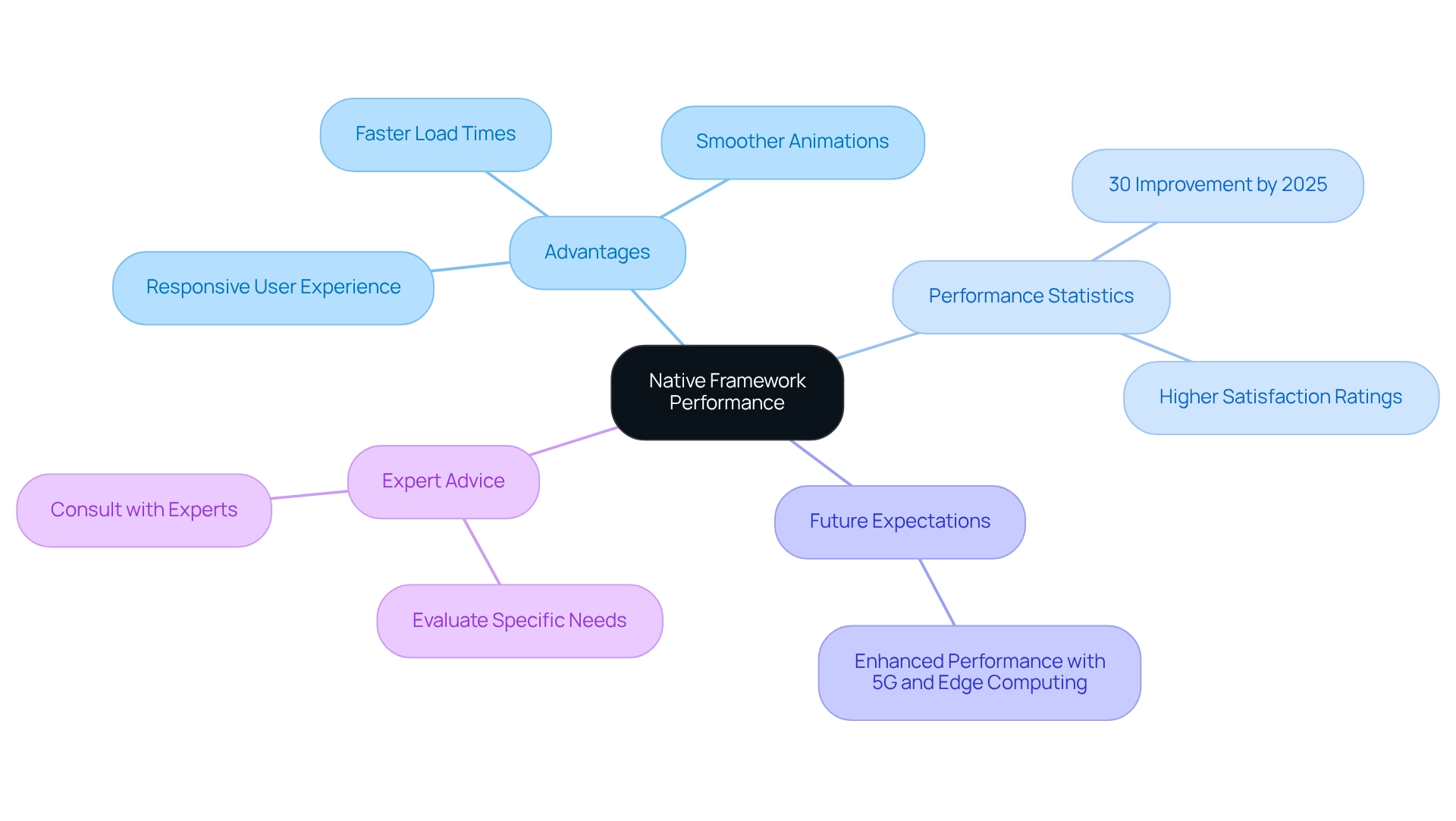
Enhanced Security: Protect Your Users with Native App Frameworks
Developers often face significant challenges when it comes to ensuring the security of their applications. Native app frameworks offer enhanced security features that are usually lacking in cross-platform solutions. By utilizing platform-specific security protocols and libraries, these frameworks allow applications to better safeguard user data and prevent unauthorized access. Furthermore, a native app framework enables programmers to implement advanced authentication methods and encryption techniques that protect sensitive information. This capability not only enhances user trust but also mitigates potential security risks, making native solutions a compelling choice for developers focused on data protection.
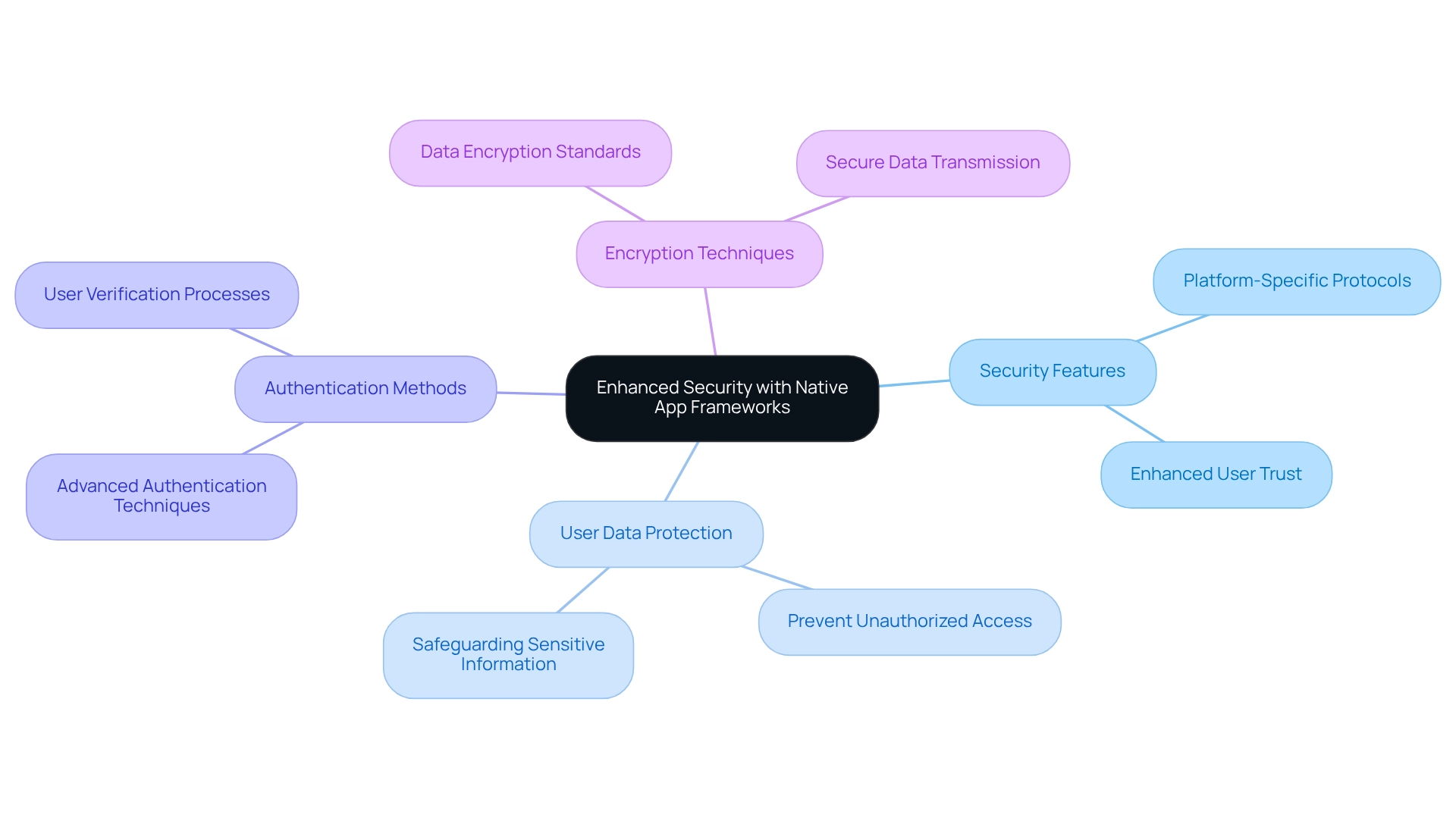
Full Access to Hardware Features: Leverage Device Capabilities with Native Apps
Native software provides unparalleled access to a device's hardware capabilities, such as the camera, GPS, and accelerometer. This direct integration allows developers to create software that effortlessly leverages these capabilities, significantly enhancing the user experience. For example, local applications can utilize GPS to deliver tailored content based on an individual's location, making interactions more relevant and engaging.
Current trends indicate that programs utilizing device hardware features achieve higher engagement rates. A notable case study demonstrates how native applications can fully capitalize on hardware capabilities through exclusive APIs, leading to improved performance and customer satisfaction. This straightforward implementation not only streamlines development but also ensures applications can respond quickly to user input, thereby enhancing overall functionality.
Furthermore, programmers have noted that the ability to directly utilize hardware features fosters a more immersive experience. As one programmer expressed, "The incorporation of camera capabilities in our original app enabled us to design features that individuals appreciate, like instant photo sharing and augmented reality experiences." This perspective is widely shared in the industry, where the strategic use of hardware features is becoming a critical differentiator in app development.
Indeed, companies such as YSO Corp have achieved remarkable success, with over 1 billion game downloads, underscoring the effectiveness of leveraging hardware features in applications. Additionally, as Chris Farm emphasizes, understanding Time to Profitability (TTP) is crucial for application creators to assess the success of their investments in client acquisition.
In summary, the advantages of direct hardware access provided by a native app framework in native app development are clear: they enable richer, more interactive software that resonates with users, ultimately driving engagement and satisfaction. To maximize these benefits, programmers should focus on thoughtfully integrating hardware characteristics, ensuring their applications not only perform effectively but also provide meaningful experiences for users.
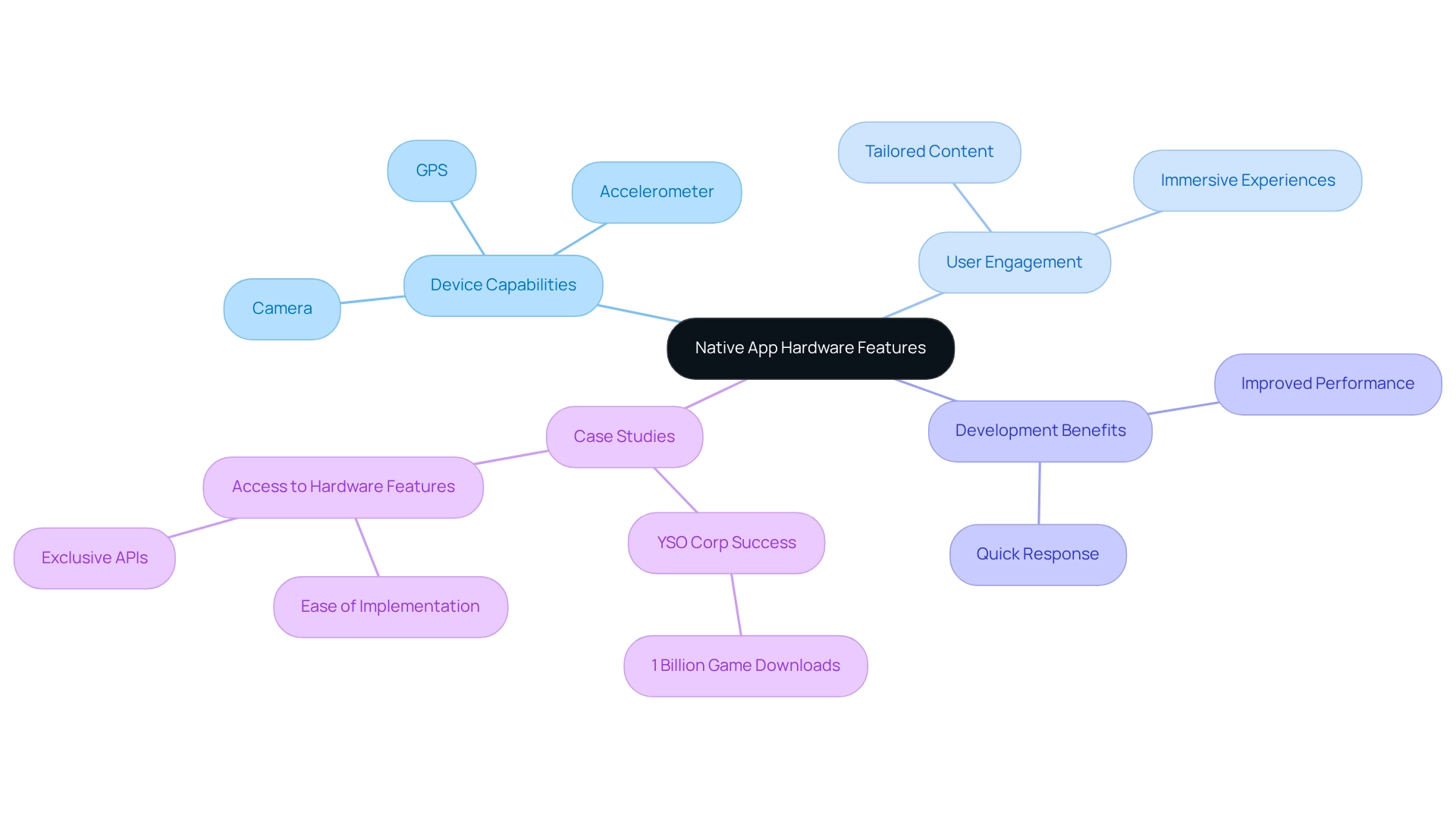
Scalability: Build Future-Proof Applications with Native Frameworks
Native frameworks offer superior scalability compared to cross-platform options, enabling creators to develop software that can handle increased load and demands without sacrificing performance. By leveraging built-in tools and libraries, developers can produce software that not only meets current needs but also adapts seamlessly to future challenges. For instance, enterprise-level software greatly benefits from native development, as it is designed to be more responsive to evolving client requirements and technological advancements.
Statistics reveal that cross-platform applications often face scalability issues, particularly under heavy traffic conditions. Conversely, local applications can effectively manage greater demands, ensuring a smooth user experience even during peak usage times. This capability is essential for businesses striving to uphold user satisfaction and engagement.
Real-world scenarios underscore the efficacy of local frameworks in high-demand settings. A case study on managing operating system updates illustrates how built-in applications can swiftly incorporate new features and APIs introduced by platforms like iOS and Android. This functionality not only boosts performance but also guarantees that applications remain compatible with the latest operating system developments—a challenge frequently encountered by cross-platform apps due to delayed updates.
Moreover, the estimated cost for implementing a Fitness Tracker App ranges from $2,000 to $3,000, emphasizing the investment aspect of app development. Expert insights further validate the long-term benefits of native app development. Analysts assert that choosing a local mobile app language can future-proof software, providing a more dependable and enhanced experience for users. As the demand for complex, resource-intensive software continues to grow, the scalability of native app frameworks is becoming increasingly vital, making them a strategic investment for developers focused on long-term success.
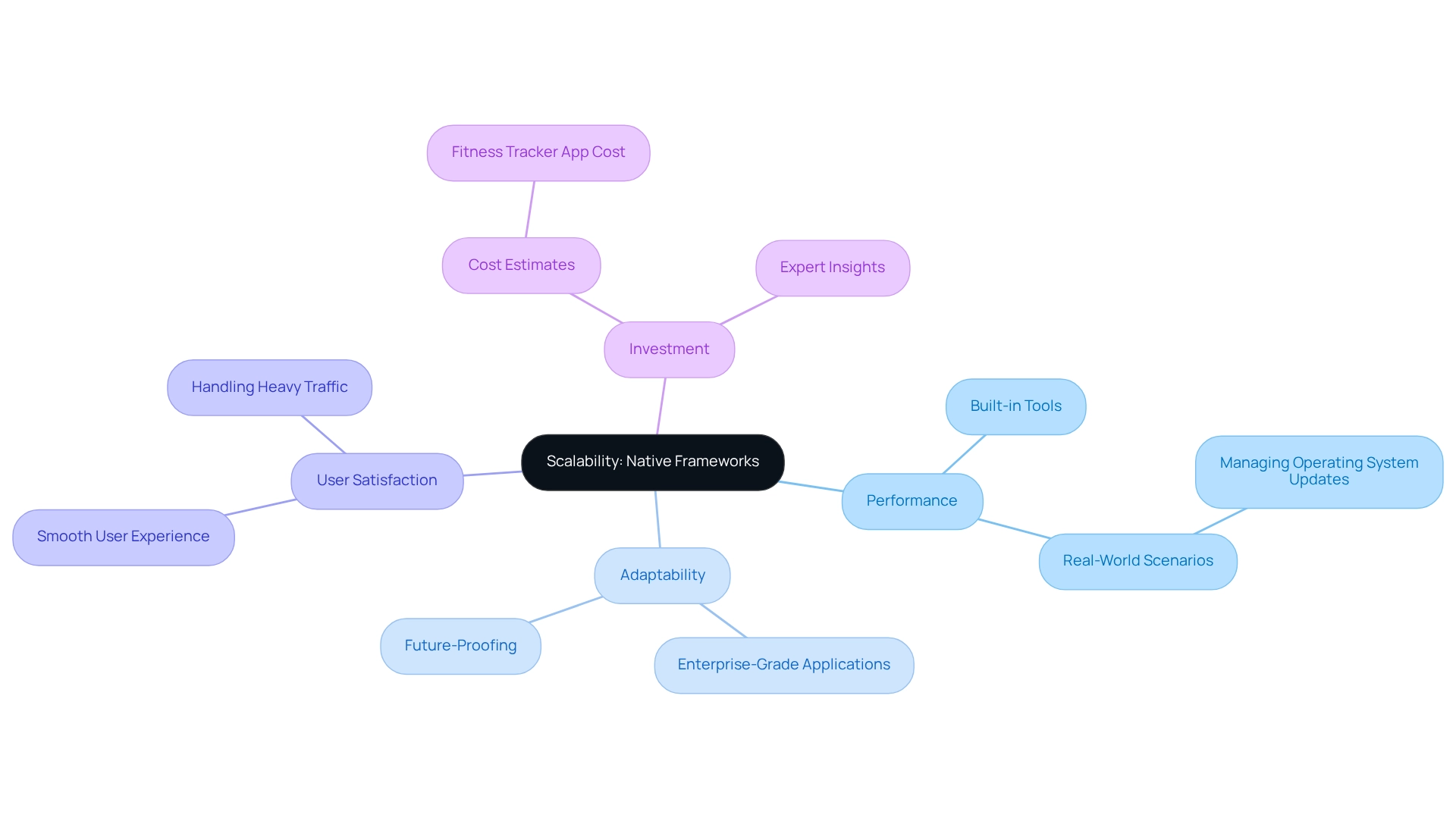
Superior User Experience: Why Native Apps Provide a Competitive Edge
Native applications excel in providing a superior experience by fully leveraging platform-specific design guidelines and components. This commitment to established design principles ensures that the app connects with individuals, fostering higher satisfaction and engagement levels. For instance, built-in applications can effortlessly incorporate gestures and animations that correspond with the operating system, leading to intuitive interactions that feel organic to users.
Statistics reveal that applications developed with platform-specific guidelines experience significantly enhanced engagement and retention rates. A notable example is Myntra, which initially launched an Android app and later built an iOS app, emphasizing quality and performance. Businesses that prioritize client experience in their native app development frequently report greater satisfaction scores compared to those utilizing cross-platform solutions.
A significant case study highlights how ongoing audience research can yield surprising insights that challenge previous beliefs about preferences. By engaging with clients throughout the design process, developers can adapt their products to better meet evolving expectations, ultimately enhancing the overall experience. The outcome of this approach is that designers can ensure their products evolve alongside client needs, leading to a more effective design process.
Expert insights further underscore the importance of platform-specific design. Vera Mirzoyan emphasizes that "it’s preferable to offer an ideal experience for just one platform than to deliver a flawed application for multiple platforms." This sentiment reflects the consensus among UX designers that focusing on a single platform enables a more refined and effective experience for users. As we approach 2025, the emphasis on the native app framework for development continues to grow, driven by the evident advantages of enhanced engagement and satisfaction.
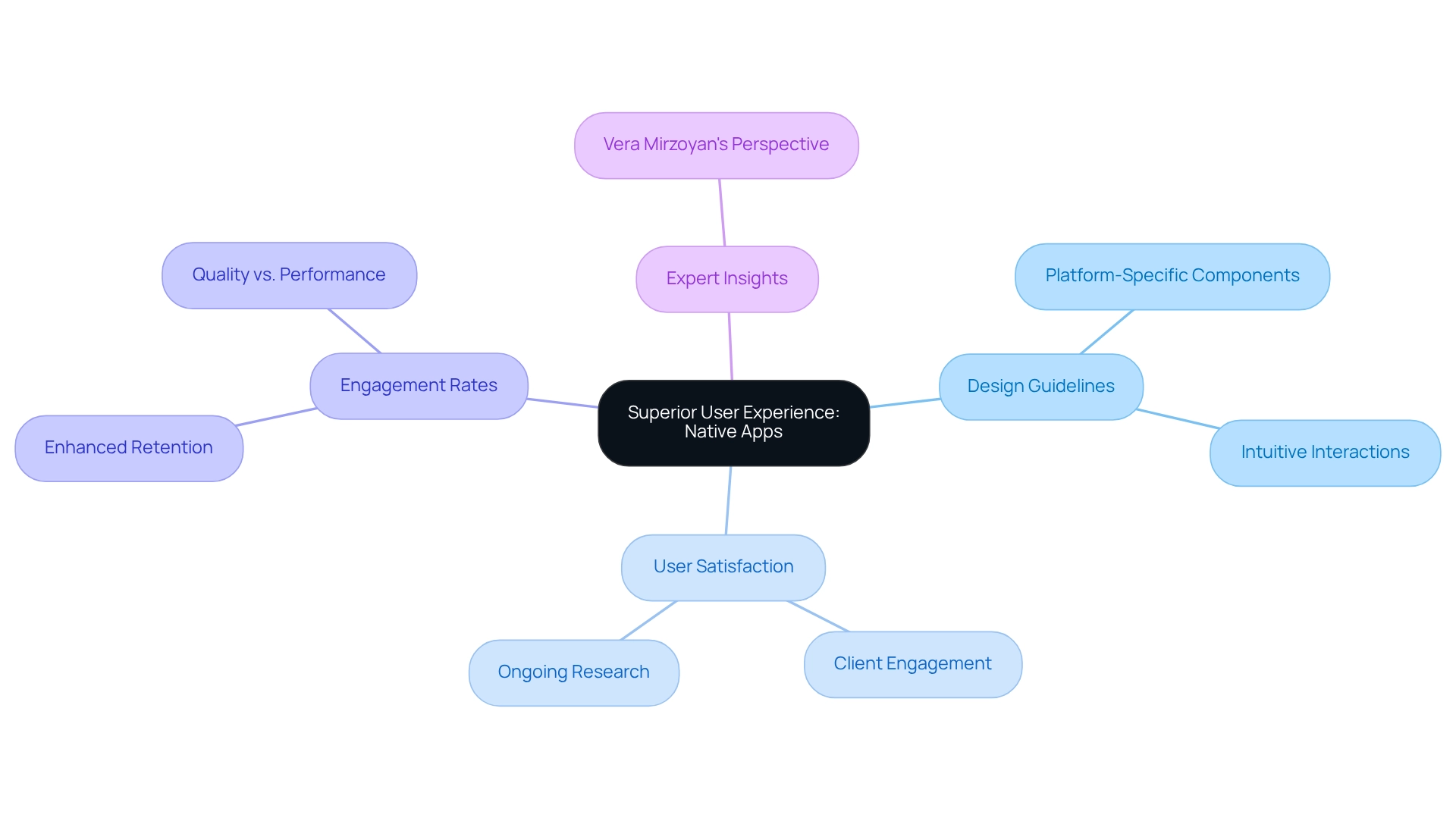
Stability: Ensure Reliable Performance with Native App Development
Applications built using a native app framework typically exhibit greater stability compared to their cross-platform counterparts. This is primarily because they are specifically designed for a single platform with a native app framework. Such a targeted approach using a native app framework significantly minimizes the potential for bugs and crashes, resulting in dependable performance that users can rely on. Utilizing a native app framework enables developers to benefit from platform-specific debugging tools, which facilitate the rapid identification and resolution of issues, thereby further bolstering the app's stability.
Have you ever wondered how much stability matters in app development? Studies indicate that apps built using a native app framework encounter reduced crash rates—often up to 50% lower than cross-platform applications—due to their optimized code and customized functionalities. Additionally, developers emphasize the reliability of these debugging tools; many note that using a native app framework leads to a more streamlined development process and fewer post-launch issues. Furthermore, case studies show that teams using a native app framework report a significant decrease in bugs and crashes, highlighting the efficiency of this method in producing high-quality software. As Steve Jobs once said, 'You can’t just ask customers what they want and then try to give that to them. By the time you get it built, they’ll want something new.' This underscores the importance of thoughtful design in app development, which is essential for achieving stability.
In addition, the characteristics of a good software tester—being detail-oriented, patient, and curious—are vital in ensuring that the debugging process is thorough and effective. Ultimately, the success of local applications is also credited to the expertise of the development teams that employ a native app framework behind them. A talented group of programmers can greatly improve the stability and performance of the final product.
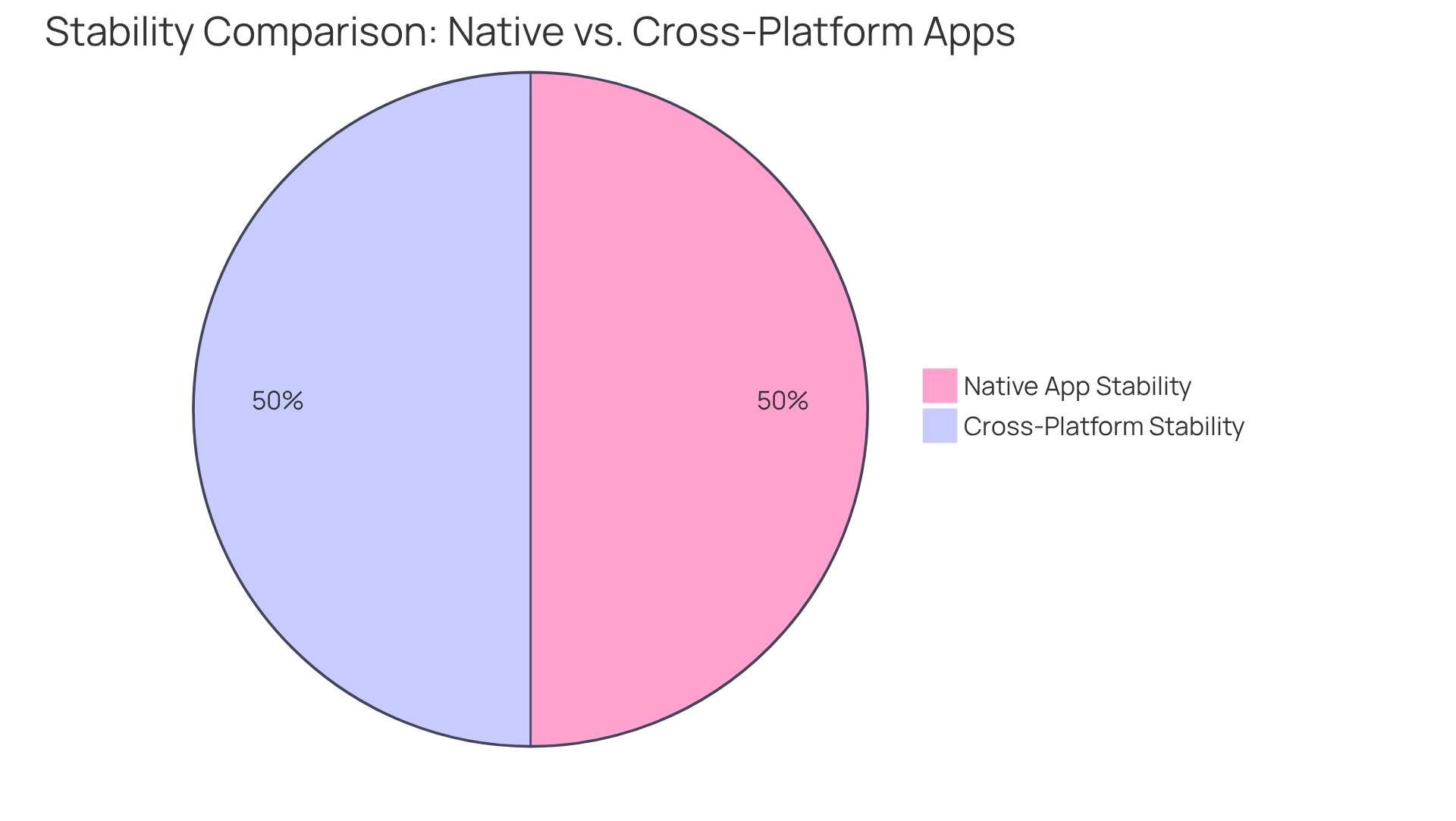
Access to Latest Tools: Stay Ahead with Native Framework Updates
Developers often encounter significant coding challenges that can hinder their productivity and efficiency. How can these obstacles be overcome? Enter Kodezi, a tool designed to address these very issues with its innovative features. Native app frameworks regularly receive updates that incorporate advanced tools and technologies, ensuring that programmers have access to the most effective resources. By choosing local development, you can utilize new features and improvements right upon release, which is essential for sustaining a competitive advantage in the market.
Kodezi CLI significantly enhances programming productivity by allowing teams to auto-heal codebases in seconds, acting as a Swiss-Army knife for programmers. This tool streamlines development processes, enabling creators to concentrate on innovation rather than maintenance. Imagine the time saved when your team can focus on building new features instead of debugging old code! To maximize the benefits of using a native app framework, consider implementing Kodezi CLI in your workflow. Not only will this improve your productivity, but it will also elevate the quality of your code. Are you ready to stay ahead in mobile application development? Explore the tools available on the Kodezi platform and transform your coding practices today.
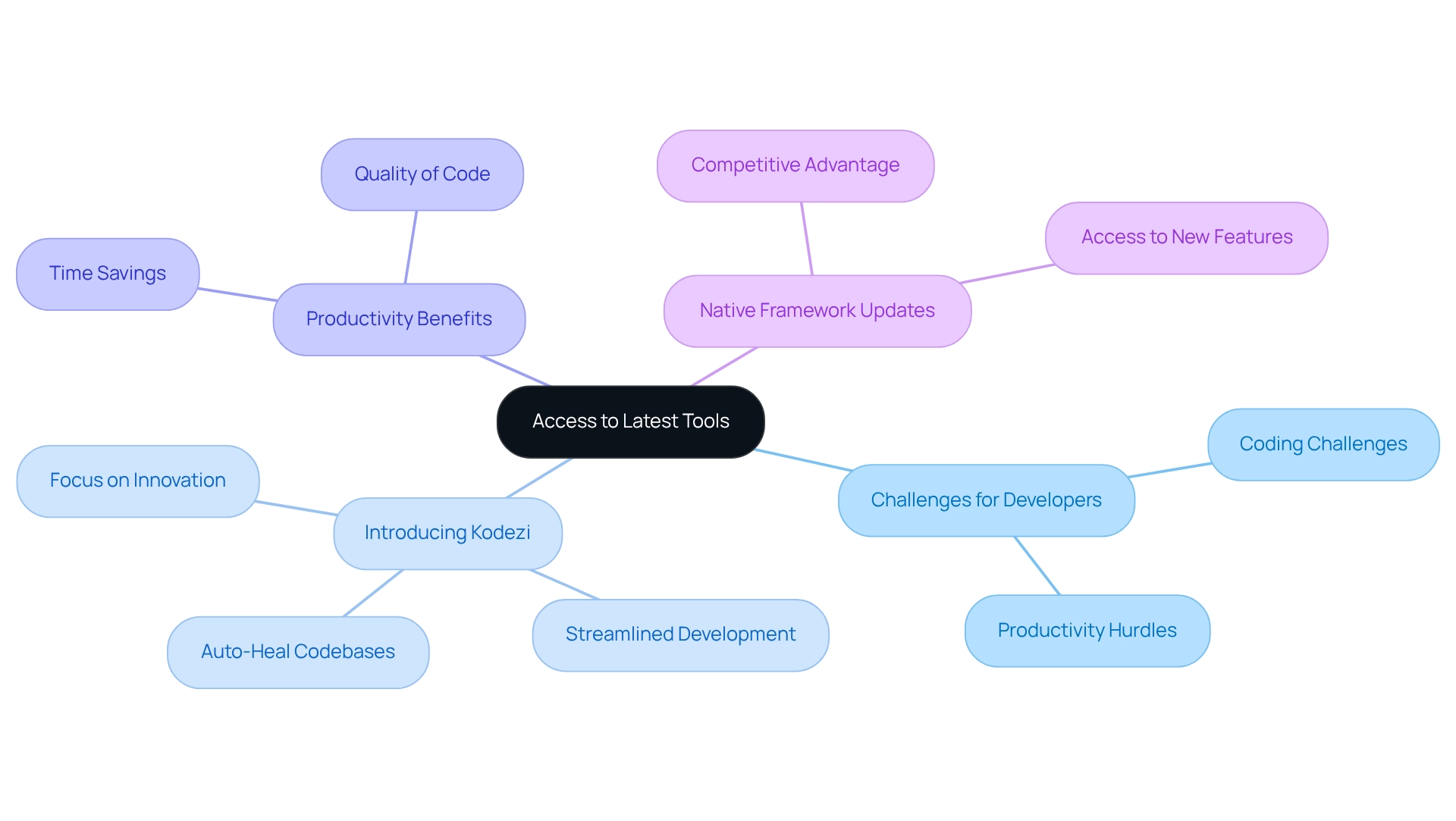
Robust Community Support: Tap into Resources for Native App Development
Developers often encounter a range of coding challenges when working with a native app framework. How can they effectively overcome these hurdles? This is where Kodezi steps in, offering a vibrant community where creators exchange knowledge, resources, and support. This collaborative atmosphere not only provides invaluable insights and troubleshooting assistance but also fosters personal growth and networking opportunities.
Engaging with this community can lead to creative solutions and enhanced project results. For instance, Kodezi actively participates in community events, motivating programmers to arrange meetings and interact. This interaction is crucial; research indicates that companies engaging with their audience on social media can lower customer turnover by as much as 15%. Such statistics underscore the importance of active involvement in community networks.
Moreover, creators frequently report that networking within these communities significantly contributes to their success. Successful app launches and improved functionality can be achieved through shared experiences and resources in a native app framework. As noted by American Express, around 71% of consumers prefer resolving customer-related issues through an app, highlighting the critical role of community engagement in enhancing user experience.
Additionally, security remains paramount for apps handling sensitive data, making collaboration essential for robust development practices. To maximize the benefits of community support, developers should actively participate in forums, attend meetups, and leverage online resources. Tools like KodeziChat can facilitate rapid coding question resolution and code issue solving. By embracing these opportunities, developers can significantly improve their productivity and code quality, paving the way for successful app development.
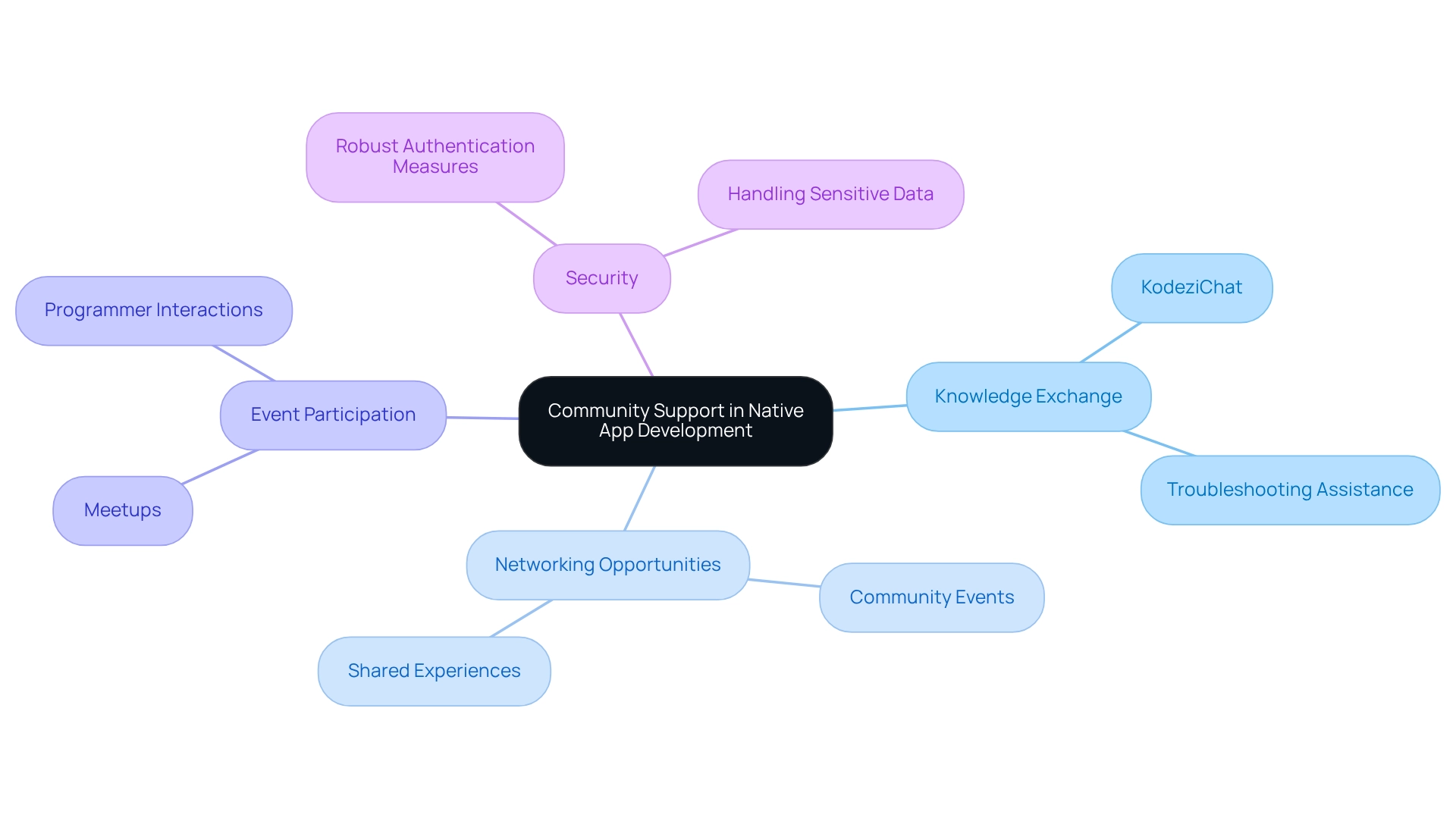
Comprehensive Advantages: Why Native Frameworks Are Essential for Your Next Project
Choosing a native app framework for your next project offers numerous benefits that are essential for contemporary app development. Have you ever faced challenges in ensuring seamless performance and security in your applications? Local frameworks provide unparalleled performance, guaranteeing that programs operate smoothly and effectively. Improved security is another significant advantage, as built-in frameworks allow for the integration of encryption and routine updates, which are crucial for safeguarding personal data.
Developers gain complete access to hardware features, enabling them to create applications that leverage device capabilities to their fullest potential. This access enhances user experiences, as applications can utilize local UI components that align with platform-specific design guidelines.
Scalability is a key consideration; local frameworks support the growth of applications without compromising performance. Stability is also a hallmark of local development, as these frameworks are designed to operate seamlessly with the operating system, minimizing the chances of crashes and errors.
Furthermore, programmers benefit from access to the latest tools and updates offered by platform vendors, ensuring they can implement advanced features. The robust community support surrounding local frameworks promotes collaboration and knowledge sharing, further enhancing the development process.
Statistics reveal that employing sophisticated memory management techniques can lead to a 30% improvement in app responsiveness. This underscores the technical advantages of local frameworks. For instance, Tesla’s original software demonstrates how these frameworks enable creators to develop programs that provide extensive control and monitoring features, improving engagement.
Similarly, tools like Kodezi CLI can greatly boost productivity by streamlining the incorporation of effective coding techniques into projects. Kodezi CLI serves as a versatile solution for B2B engineering teams, autonomously improving code quality and fixing bugs before they reach production. With features such as automated code reviews and real-time error detection, Kodezi CLI ensures that applications not only meet user expectations but also maintain high standards of quality.
To see Kodezi CLI in action, why not check out our demo and discover how it can transform your development process? In summary, choosing a native app framework not only meets user expectations but also positions applications to stand out in a competitive market. This makes it a strategic choice for developers aiming for excellence in their projects.
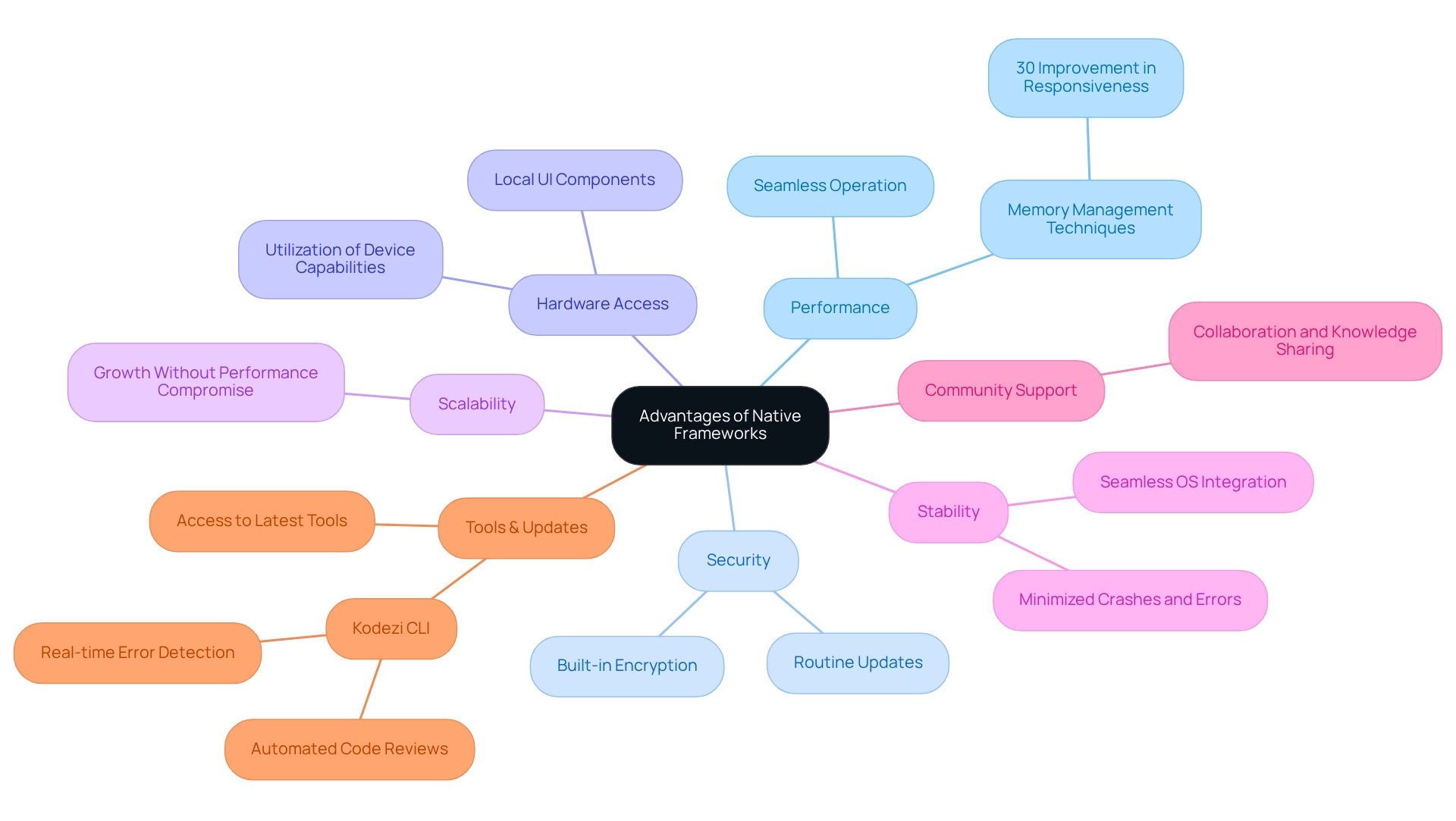
Conclusion
The advantages of native app development are clear and compelling, making it an essential choice for developers facing coding challenges. By leveraging native frameworks, developers can achieve unmatched performance, enhanced security, and full access to device capabilities, contributing to superior user experiences. Additionally, the ability to create applications that are responsive, stable, and scalable ensures they can grow alongside user demands without sacrificing quality.
Furthermore, native frameworks provide developers with access to the latest tools and updates, fostering innovation and ensuring that applications remain competitive in a rapidly evolving market. The robust community support surrounding native development enhances the learning process, offering invaluable resources and collaboration opportunities that lead to successful project outcomes.
In addition, the decision to choose a native framework is a strategic investment in the future of app development. With the right tools, like Kodezi CLI, developers can streamline their processes and focus on creating engaging, user-centric applications. As the landscape of mobile app development continues to evolve, embracing native frameworks will undoubtedly position developers for success in delivering exceptional applications that resonate with users and stand out in a crowded marketplace. Are you ready to explore how Kodezi can enhance your development experience?
Frequently Asked Questions
What challenges do developers face regarding API documentation?
Developers often struggle with producing standardized API documentation, which can be time-consuming and distract from their primary coding responsibilities.
How does Kodezi help with API documentation?
Kodezi's Professional OpenAPI Specification Generator significantly reduces the time spent on documentation tasks, allowing developers to focus on coding instead.
How much time do programmers typically spend on manual API testing?
Research indicates that programmers allocate approximately a third of their development time to manual API testing with improvised tools.
What are the benefits of incorporating Kodezi into a development workflow?
Incorporating Kodezi accelerates the development process of native app frameworks, ensures compliance with professional standards, and enhances collaboration by automatically producing OpenAPI specifications and establishing Swagger sites for APIs.
What improvements have organizations seen by adopting automated API documentation tools?
Organizations that adopt automated API documentation tools report significant improvements in performance and customer retention.
Why is standardized API documentation important?
Standardized API documentation enhances developer productivity, enabling teams to produce high-quality software more efficiently.
What additional features does Kodezi offer besides API documentation?
Kodezi also offers advanced debugging features that can streamline development projects.
How can developers benefit from using Kodezi?
Developers can spend less time on documentation and more time on coding, ultimately transforming their development process with automated OpenAPI 3.0 specification generation.




